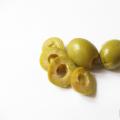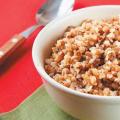How many calories are in salted peanuts. Calorie content of pickled cucumbers and dietary properties Calorie content of pickled cucumbers per 100 g
Calories, kcal:
Proteins, g:
Carbohydrates, g:
Caloric content of salt
The calorie content of salt is 0 kcal per 100 grams of product.
The composition and harm of salt
Salt or chloride is a white crystalline mineral that occurs naturally; dissolves in water; one of the few minerals that humans eat. Salt is essential for the human body, but excessive consumption can increase the risk of various diseases, including high blood pressure and stroke.
Useful properties of salt
Salt is involved in maintaining and regulating the water-salt balance in the body, sodium-potassium ion exchange. The body compensates for the lack of salt by the destruction of bone and muscle tissues. Lack of salt can lead to depression, nervous and mental illnesses, indigestion and cardiovascular activity, smooth muscle spasms, osteoporosis, anorexia (calorizer). With a chronic lack of salt in the body, a fatal outcome is possible.
Excess salt in the diet is absorbed by the body. The control of the optimal content in the blood is ensured by its excretion through the kidneys in the urine. Some of this element is lost through sweat.
A person with a salt deficiency usually feels weak and drowsy, with a prolonged absence of salt, dizziness, nausea, loss of taste, and sometimes a complete loss of taste appear.
Salt in cooking
Salt is used in cooking in almost all dishes, for its intended purpose, to make them salty. Salt goes well with meat, fish, vegetables, side dishes and other foods.
An important note - pickles and pickles are not the same thing. Pickled cucumber is harvested without the use of vinegar, with a lot of herbs and spices. Cucumbers are poured with very salty water and placed in a wide and deep container - an oak tub, for example.
The pickle marinade contains vinegar, salt, sugar and spices. Cucumbers are usually poured with hot brine. This method of harvesting inevitably partially destroys useful trace elements and vitamins. In our material, we will talk about pickled cucumbers, but in some cases we will make the necessary clarifications.

Salted and pickled cucumbers are loved for their special taste, for crunchiness, for brine, which is an integral part of pickling. But perhaps few people think that such cucumbers in some cases can be useful. What is the reason for this?
Firstly, the vegetable contains a number of nutrients and microelements, which are preserved during the salting process (in pickled vegetables, their amount will be less). These are vitamins of group B, C, vitamins A and E. In addition, cucumbers are rich in sodium, potassium, phosphorus, calcium, iron, zinc and other useful elements.
Secondly, in the process of salting in vegetables and brine, lactic acid is formed. Its importance can hardly be overestimated - it participates in the processes of digestion and blood circulation: it helps to stimulate blood circulation and digestion, and lowers blood pressure. In addition, lactic acid lowers blood lipids. For athletes, lactic acid is an essential tissue fuel during intense exercise.
Third, like many vegetables, cucumber is a natural antioxidant. Also, pickled cucumber helps to lower blood cholesterol levels.
Fourth, pickled cucumber is a source of fiber and iodine, making it important for people with thyroid problems.
But pickled and salted vegetables are contraindicated for people with liver and kidney diseases (hepatitis, cholecystitis, pyelonephritis, cholelithiasis, renal failure, etc.), as well as for hypertension and atherosclerosis. Saturation with potassium makes them a powerful diuretic product, it is in this connection that people with the above diseases need to be careful when using this vegetable. Pickle brine can leave an unpleasant sensation in people with sensitive tooth enamel. It is also important to remember that cucumber pickle has a mild laxative effect.

So, the calorie content of cucumbers is about 14-16 kcal per 100 grams of the product, for pickled ones it is slightly more - about 16 kcal per 100 grams of product due to the use of sugar in the marinade. In some sources, you can find information that the calorie content of cucumbers when salted in a barrel is not more than 16 kcal. At the same time, there are only 1.7 grams of carbohydrates in pickled cucumbers. The calorie content of the brine is approximately 12 kcal per 100 grams of product. However, the calorie content of cucumbers, their saturation with vitamins and nutrients directly depend on the vegetable variety and growing conditions.

This content of kcal in the product allows it to be included in various diets. Such gurtsy restore the water-salt balance and promote the elimination of toxins from the body. Pickled cucumbers stimulate appetite, and in various salads they also perfectly satisfy this hunger. But still, pickled and pickled cucumbers are valued all over the world primarily for their taste, special aroma, light crunch and elasticity. For pickled and pickled vegetables, it is important to choose the right variety, not let them overripe and salt them fresh. For diets, this product has no benefit or value.
Jan-14-2013
Diet properties:
Cucumber is a wonderful vegetable and is often found in various types of diets. Even salty ones (not to be confused with pickled ones!) Are included in the list of foods recommended for daily consumption. There are tons of recipes that include pickles. And in themselves, they are a favorite delicacy of many. That is why many are interested in what calorie content of pickled cucumbers and what dietary properties do they have?
Cucumbers are a rich source of compounds of an element such as iodine. These substances are easily and painlessly absorbed by our body with you. Experts say that those of us who regularly include a diet of fresh cucumber are less at risk of developing diseases of the thyroid gland and blood vessels.
The mineral composition of fresh cucumbers is preserved in salted cucumbers. 99% of the mass of a cucumber fruit is water. Moreover, they contain potassium, phosphorus, calcium, magnesium, iron, zinc, vitamin C, vitamins of group B, PP, E, carotene (provitamin A).
As a result of fermentation, lactic acid is formed in cucumbers, which has a beneficial effect on the functions of the digestive tract.
Pickles, which are obtained from cucumbers, contain a lot of organic matter - fiber, which is necessary for the normal functioning of the digestive system and for the prevention of cancer. Like other vegetables, they also contain antioxidants that neutralize dangerous free radicals.
Pickles contain a number of beneficial microorganisms that can control the development of harmful gut microbes. The lactic acid that appears in pickles when they ferment has the ability to reduce fat in the bloodstream, stimulate circulation, and normalize high blood pressure. In addition, lactic acid contributes to the improvement of the digestive system, introduces the necessary bacteria into the intestinal tract.
Considering that these vegetables are 95% water, the number of calories in them a priori cannot be not that large, but even anything significant to cause concern for those who monitor their weight. But if the cucumber pickle contains sugar, this figure may increase to some extent (this depends on the amount of sugar).
How many calories are in pickles?
And here's how much:
The calorie content of pickled cucumbers is 11 kcal per 100 grams.
Proteins, fats and carbohydrates (BZHU) per 100 grams:
Proteins - 0.8
Fats - 0.1
Carbohydrates - 1.7
And what is the calorie content of such cucumbers prepared in different ways? But this one:
Calorie table, per 100 grams of product:
And their nutritional value is as follows:
Nutritional value table, per 100 grams of product:
Recipe? Recipe!
How to cook pickles properly? Here's one of the recipes:
Crispy cucumbers:
Products:
- Fresh cucumbers -5 kg.
- Dill (sticks and umbrellas) - 5 pieces
- Garlic - 10 cloves
- Horseradish (leaves) - 8 pieces
- Currants (leaves) - 20 pieces
- Salt, pepper (red and black)
- Bay leaves - 8 pieces
Cucumbers are washed and cut off from them "butts". Placed in a saucepan - for soaking, along with dill, garlic, currant leaves. We fill all this with brine (for 1 liter of water, 2 tablespoons of salt are taken). We leave all this under oppression for 2 days.
The spices are removed, the brine is filtered, and the cucumbers are washed.
Cucumbers and new spices are placed in pre-sterilized jars. Add bay leaves and pepper. The brine must be boiled, then, while still hot, pour into the jars. Banks are closed with nylon lids. So it's ready, almost a dietary product.
Great video. Worth seeing!
What are the benefits of pickles for weight loss?
Despite their low calorie content, they are not recommended for use in weight loss diets due to the high content of salts that retain water in the body, reducing the rate of metabolic processes and slowing down the process of losing weight.
These cucumbers are high in fiber, which helps cleanse the gastrointestinal tract, antioxidants necessary to bind free radicals, beneficial bacteria that inhibit pathogenic intestinal microflora, lactic acid, which lowers blood cholesterol, normalizes blood pressure and improves blood circulation.
Therefore, outside the season, when it is not possible to eat fresh cucumbers, it is allowed to include pickled cucumbers in the menu in reasonable quantities. Lightly salted cucumbers, the calorie content of which is also low, while the amount of salt in them is insignificant, and vitamins and nutrients are practically preserved, can be used in diets for weight loss, but not more than 100-200 g per day.
Pickled cucumbers are perfectly absorbed by the body, do not cause allergic reactions, promote weight loss, but have a number of contraindications:
- Presence of kidney stones
- Hepatitis
- Gout
- Hypertension
- Chronic nephritis
- Diseases of the heart and blood vessels
- Diseases of the gastrointestinal tract
- Liver disease
Pickled cucumbers are obtained by preparing a brine, where seasonings, spices, auxiliary vegetable components are added. The composition of the brine regulates the taste, which directly affects the final taste of the finished cucumbers.
How many calories are in pickled cucumber
The calorie content of pickled cucumbers per 100 grams of product is 11 kcal. Such a low calorie content in pickled cucumber is due to its composition: 95-97% of it consists of water, suitable for improving appetite and reducing calorie intake. Many diets, how to lose weight by 5 kg or more, allow the use of pickles, since they are absolutely harmless to the figure and at the same time improve the digestion of other foods, as they force the stomach to increase the amount of gastric juice produced.
However, if you decide to lose weight on cucumbers, you should give preference to fresh vegetables. We'll explain why a little later.
Nutritional and energy value of pickled cucumbers
Nutritional value of pickled cucumbers:
- - dietary fiber - 0.8;
- - organic acids - 0.7 grams;
- - water - 92 g;
- - saccharides - 1.6 grams;
- - ash - 3.9 g.
The energy value of pickled cucumbers per 100 grams of the product is according to the ratio: 75% - water, 25% proteins and less than 1% - fats. Proteins 0.8 g per 100 grams, carbohydrates 1.7 grams.
The composition of pickled cucumbers
Pickled cucumbers contain lactic acid. It helps to improve digestion, metabolism, and intestinal health.
Depending on the variety, the composition of pickled cucumbers can vary, as well as the percentage of water content. In some cases, it reaches 99%. The composition contains phosphorus, potassium, calcium, iron, zinc, magnesium, vitamin A, vitamins of group B. A high content of fiber, antioxidants that can help fight free radicals.
The benefits and harms of pickles
The composition of pickled cucumber allows us to conclude that iodine in this product accumulates in the body and reduces the likelihood of problems with the thyroid gland.
Pickled cucumber neutralizes the toxicity that is formed with the use of foods provoking negative processes. Also, if the consumer has a negative reaction to vegetables, adding pickles to the diet, you can safely increase the portion of your favorite product. However, do not get carried away: with a large intake of salty foods, the appetite increases, and there is a tendency to edema associated with fluid retention in the body.
The condition of the gastrointestinal tract improves after the start of the use of cucumbers. This is achieved due to the fact that the chemical composition of pickled cucumber includes beneficial bacteria. However, there are some limitations.
The harm of pickles is observed in people who suffer from hypertension, problems with the cardiovascular system. To put the body in order and, it is recommended to adhere for two weeks, which provides for limiting the amount of salt. In some cases, diseases of the heart and blood vessels require the abandonment of pickles on an ongoing basis: recommendations for nutrition are prescribed in such situations by the attending physician.
Pickles are not allowed for those who suffer from kidney stones, cholecystitis, hepatitis, chronic renal failure. Gastroenterologists are also categorically speaking: you cannot eat pickles for gastritis, problems with the intestines and stomach.
The brine acts as a laxative, but the dose should not be exceeded with its use. The norm is a small glass of 200 ml per day. It is not recommended to consume it every day, especially for people with kidney problems.
 Invisible calories: why alcohol gains weight Calorie content of alcoholic beverages in 100 g
Invisible calories: why alcohol gains weight Calorie content of alcoholic beverages in 100 g Olives: useful properties
Olives: useful properties How many calories in buckwheat Kcal of buckwheat porridge on water
How many calories in buckwheat Kcal of buckwheat porridge on water